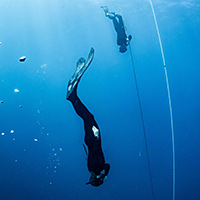While the first whale sharks are already flaunting around the Nosy Be area and I am fully preparing for this year’s promising season, it’s time to take a final look back at last year’s results. And what a year it was! Our third official season in the field was a season of coming to age for the project: we were able to expand our field research with some amazing results and we started our educational program for local youth of Nosy Be, which I am very passionate about.

Michel and the boys
In terms of whale sharks it was a rather
unusual season. The bulk of them arrived relatively late to Nosy Be, at the
beginning of October. There was another peak of high activity at the end of
November. And in between those peaks whale shark sightings were rare with a two
week period in the beginning of November, where the average shark per day
dropped to 1.08 (instead of 3.4). We even thought the whale sharks had already
gone!
We identified 140 individual whale sharks last year in the area. 90% of them
were males, between 3 to 7 meters long as every year. Just like previous years
we saw MD-151 (he prefers to be called Michel though) the most -on 22 days- and
three of his friends were also spotted frequently. Female sightings are still
rare, with only 3 known females returning since 2015. This brings the total 322
different whale sharks identified since 2015.
51 out of 140 identified individuals returned to Nosy Be last year, all the others were new. Still none of all the Nosy Be sharks have been identified elsewhere in the region, or in the world, despite ongoing data collection in surrounding countries. We are currently investigating their movement patterns to establish whether most of the whale sharks are temporary visitors or residents.
Passport to the future
One of the things I am most excited about is our educational program, now known as Les Guardiens de L’Océan (The Guardians of the Oceans), a partnership with local partner NGO MADA Megafauna. Bruno, a local from Nosy Be, has been heading to two schools to talk to children aged 8-12 about whale sharks. Also, every Saturday kids were gathering on the beach for fun and eco-friendly activities with Bruno. Thanks to a successful crowdsourcing project (thank you so much!), we are able to expend this project to other schools on the island.

I’m happy to say that the code of conduct we implemented in 2017, available in 3 languages, has been adopted by most operators throughout the area, which is a great step. Yet each year it is a growing worry for us as tourism is steeply rising so we are busy working on implementing the code of conduct at the next level, more on this soon.
All tourists on board of both our partner operator Baleines Rand’eau and Safari Baleine boats have received a briefing on how to interact with the most beautiful animal in the world (I’m biased). We have been collecting socio-economic data from tourists and are busy processing these at the moment.
In a few weeks, I am heading to Australia to present our results at the Fifth International Whale Shark Conference. I’m so excited for the chance to meet the world’s whale shark experts and tell them about our work, the last conference was in mid-2016 !
In the meantime we are also busy preparing for the upcoming season, if you’d like to join as a volunteer check out the eligibility criterias here.

 May 10, 2019
May 10, 2019